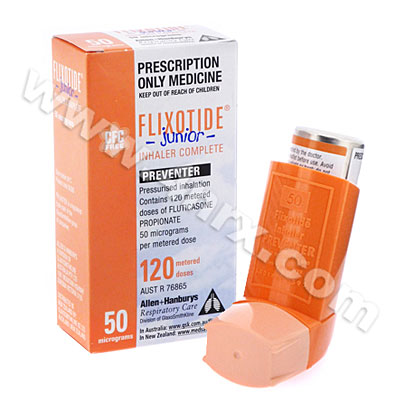 |
Home  Asthma Asthma  Flixotide Inhaler (Fluticasone Propionate) Flixotide Inhaler (Fluticasone Propionate) |
|
|||||||||
|
Flixotide Inhaler (Fluticasone Propionate)
What is Flixotide Inhaler (Fluticasone Propionate) used for? Flixotide Inhaler (Fluticasone Propionate) is a type of corticosteroid that is used in the treatment of asthma. This medication is effective in preventing symptoms of asthma, such as wheezing and coughing, as well as helping to reduce swelling in the airways. This helps the patient to breathe easier. It is sometimes used in combination with other drugs to help control the symptoms of other lung diseases, such as bronchitis and emphysema. How should I use Flixotide Inhaler (Fluticasone Propionate)? Flixotide Inhaler (Fluticasone Propionate) is inhaled orally. Patients should insert the inhaler into the mouth, and administer the medication by pressing on top of the canister, and inhaling deeply. It is important to hold your breath for 5 to 10 seconds after administering the spray, after which you may gently exhale. If you have been directed by your physician to take more than one spray, you should wait for 15 seconds before administering the next dose. What are the side effects of Flixotide Inhaler (Fluticasone Propionate)? Some side effects associated with Flixotide Inhaler (Fluticasone Propionate) include:
If any of these side effects persist, or worsen, you should immediately consult your physician. This medication may also cause other more serious side effects to occur, such as pain in the muscles, tiredness, changes in vision, signs of fever or severe breathlessness. Please Note Strictly follow all instructions provided to you by your physician or pharmacist while using Flixotide Inhaler (Fluticasone Propionate). Optimum and safe dosage can differ based on the patient and the condition being treated. As this medication may be unsafe for certain patients, it is essential you always inform your physician if you are pregnant or breastfeeding, as well as if you have any allergies, other illnesses, or ongoing health conditions, and if you are taking any other form of medication, supplements, or herbal products. Immediately seek emergency medical care if you have any allergic or hypersensitive reaction. Common signs of a reaction include hives, swelling, skin rashes, chest pains, as well as trouble breathing or swallowing. 


|
|||||||||||||||||